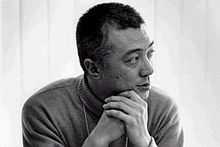Hiroshi Teshigahara
| Hiroshi Teshigahara | |
|---|---|
 | |
| Born |
January 28, 1927 Chiyoda, Tokyo, Japan |
| Died |
April 14, 2001 (aged 74) Tokyo, Japan |
| Occupation | Film director |
| Spouse(s) | Toshiko Kobayashi |
Hiroshi Teshigahara (勅使河原 宏 Teshigahara Hiroshi, January 28, 1927 – April 14, 2001) was an avant-garde Japanese filmmaker. He received an Academy Award nomination for Best Director for his 1964 film The Woman in the Dunes.
Life and career
Teshigahara was born in Tokyo, son of Sofu Teshigahara, founder and grand master of the Sogetsu School of ikebana. He graduated in 1950 from the Tokyo National University of Fine Arts and Music and began working in documentary film. He directed his first feature film, Pitfall (1962), in collaboration with author Kōbō Abe and musician Tōru Takemitsu. The film won the NHK New Director's award, and throughout the 1960s, he continued to collaborate on films with Abe and Takemitsu while simultaneously pursuing his interest in ikebana and sculpture on a professional level.
In 1965, the Teshigahara/Abe film Woman in the Dunes (1964) was nominated for an Academy Award for Best Foreign Language Film[1] and won the Special Jury Prize at the Cannes Film Festival.[2] In 1972, he worked with Japanese researcher and translator John Nathan to make the movie Summer Soldiers, a film set during the Vietnam War about American deserters living on the fringe of Japanese society.
From the mid-1970s onwards, he worked less frequently on feature films as he concentrated more on documentaries, exhibitions and the Sogetsu School and became grand master of the school in 1980.
In 1978, Teshigahara Hiroshi directed the final two episodes of the long running and popular Japanese television series Shin Zatouichi, starring Shintaro Katsu as the blind wandering Yakuza. During Akira Kurosawa's 5 year hiatus from filmmaking, he watched a lot of television and was particularly taken by the final episode of Shin Zatouichi - Episode: Journey of Dreams (新座頭市「夢の旅) (1978). The influence of this particular episode included the initial casting of Shintaro Katsu in the lead roles in Kagemusha and the extended artistic dream sequences contributed to those seen in Kagemusha (1980).
On the first anniversary of his death, April 14, 2002, a DVD box set containing his best known work was released in Japan in commemoration.
Filmography
Complete filmography of Hiroshi Teshigahara include:[3][4][5]
- Hokusai (北斎) (1953)
- 12 Photographers (十二人の冩真家) (1955)
- Ikebana (いけばな) (1956) or 蒼風とオブジェ いけばな (1957) - director and screenplay
- 有楽町0番地 (1958) - screenplay
- Tokyo 1958 (東京1958) (1958)
- 海は生きている (1958) - art
- José Torres (ホゼー・トレス) (1959) - director and shooting
- Pitfall (おとし穴) (1962) - director
- Woman in the Dunes (砂の女) (1964) - director
- White Morning (白い朝) (1965)
- Jose Torres Part II (ホゼー・トレス Part II) (1965)
- The Face of Another (他人の顔 Tanin no Kao) (1966) - director
- Bakusō (爆走) (1966)
- インディレース 爆走 (1967) - producer
- The Man Without a Map (燃えつきた地図 Moetsukita Chizu) aka The Ruined Map (燃えつきた地図) (1968) - director
- 240 Hours in One Day (1日240時間) (1970)
- Summer Soldiers (サマー・ソルジャー) (1972) - director, planning and shooting
- Warera no Shuyaku (われらの主役) (1977) - TV film
- Shin Zatōichi - Episode: Journey of Rainbows (新座頭市「虹の旅」) (1978) - TV film
- Shin Zatōichi - Episode: Journey of Dreams (新座頭市「夢の旅」) (1978) - TV film
- Sculpture Mouvante - Jean Tinguely (動く彫刻 ジャン・ティンゲリー) (1981)
- Antonio Gaudí (アントニー・ガウディー) (1984) - director, producer and editing
- Rikyu (利休) (1989) - director, producer and screenplay
- Princess Goh (豪姫) (1992) aka Basara - The Princess Goh - director, producer and screenplay
References
- ↑ "The 37th Academy Awards (1965) Nominees and Winners". oscars.org. Retrieved 2011-11-05.
- ↑ "Festival de Cannes: Woman in the Dunes". festival-cannes.com. Retrieved 2009-02-28.
- ↑ (Japanese) http://www.jmdb.ne.jp/person/p0285850.htm accessed 19 May 2009.
- ↑ Hiroshi Teshigahara Filmography (1953 - Present)
- ↑ (Japanese) 勅使河原宏 映画作品リスト (1953 - 現在)
External links
- TeshigaharaHiroshi.com
- Senses of Cinema: an essay on Hiroshi Teshigahara
- Hiroshi Teshigahara at Strictly Film School
- Hiroshi Teshigahara at the Internet Movie Database
- Hiroshi Teshigahara at the Japanese Movie Database (Japanese)
| ||||||
|